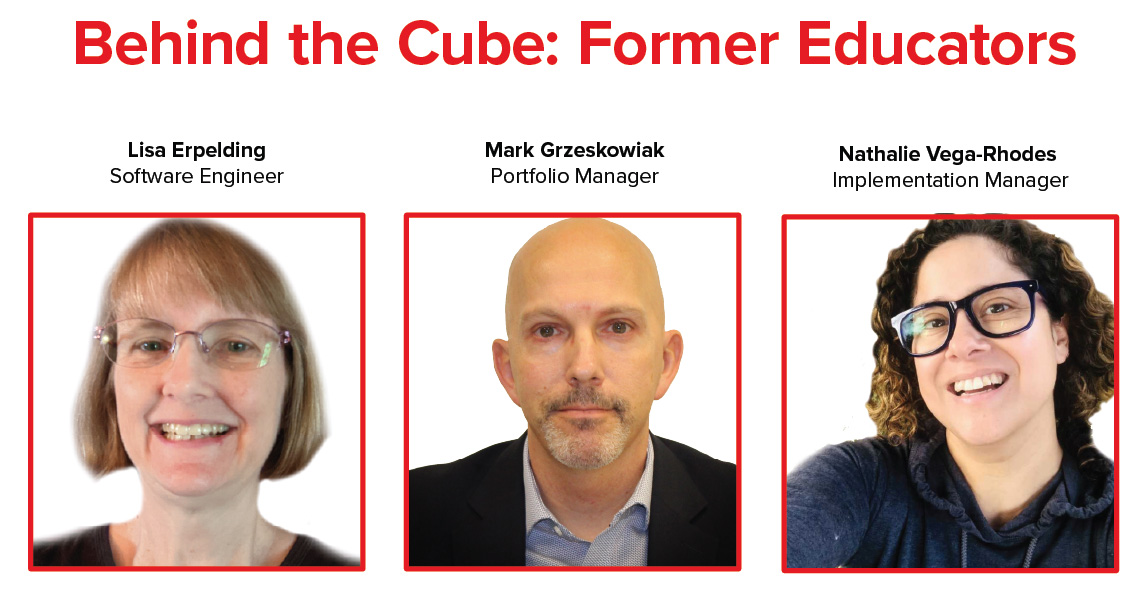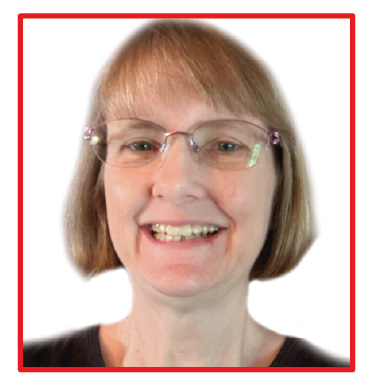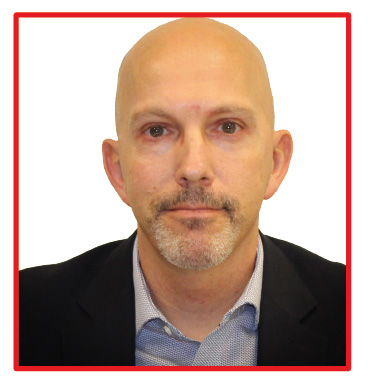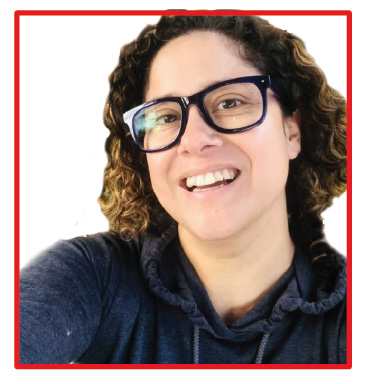My Account Details
Behind the Cube: Former Educators at McGraw Hill
Learn what it's like to transition from the classroom to an education company like McGraw Hill.
Ever wonder what it's like to transition from the classroom to an education company? At McGraw Hill, we hire former educators because they know what educators and students need.
In our "Behind the Cube" series, we introduce employees who embody our mission, passion and values. This month, meet three employees who use their teaching experience to make an impact at McGraw Hill.


Questions and Answers:
Tell us a bit about you, your experience as an educator, and your role at McGraw Hill.
For most of my 25-year career, I taught Algebra and Advanced Algebra to 8th graders in Minnesota middle schools ranging from 450 to over 1200 students. My favorite parts of teaching were collaborating with wonderful math colleagues and continually improving curriculum and classroom practices to increase the learning of my students.
I’ve always thought I would enjoy working in the tech industry. Several summers ago, I taught myself enough Python to create an app to meet a need in my classroom. Between that success and all the uncertainties of COVID-19 last year, it seemed a good time for launching my second career. Equally excited and terrified, I completed a Coding Dojo boot camp and landed an internship at McGraw Hill. I have fallen in love with McGraw Hill and my team and am excited that I get to stay as a full-time Software Engineer. I write code for products that help increase the potential of teachers and students.
What transferable skills did you learn from your time as an educator and how have you applied them to your role at McGraw Hill?
I’ve been surprised by the number of skills that have transferred from teaching. As a teacher, I routinely broke large amounts of information (for example, an Algebra course) down into smaller and smaller chunks until it was accessible to my students. Then, I needed to sequence the learning so that it would fit together and make sense to them.
As a Software Engineer, I take a feature that needs to be coded and break the work down into pieces, sequencing them in a way that makes sense. In both teaching and coding, I continually assess and reflect upon whether my approach is working.
Other skills that have transferred from teaching to software engineering include time management, presentation, and problem-solving skills. Teachers develop impressive time management skills to accomplish their incredible amounts of daily work – lesson planning, grading work, responding to emails, updating student grades, making copies. I regularly demonstrate features to our stakeholders at monthly demos. I developed problem-solving skills for investigating, researching, experimenting, and evaluating actions in my classroom to help my students succeed. I use those same skills now as a Software Engineer when investigating the code base, researching ideas online, experimenting to see what works, and evaluating the quality of my code.
What impact are you able to make on education in your role, even though you are no longer in the classroom?
I love that I will still be contributing to student learning as a Software Engineer at McGraw Hill. The products and features I work on will make teaching easier, freeing teachers to do more of what computers cannot do for their students. This technology also increasingly personalizes the delivery of concepts and practice that students need to maximize their learning. It’s an exciting time to be a software engineer in EdTech!

Questions and Answers:
Tell us a bit about you, your experience as an educator, and your role at McGraw Hill.
I am the Portfolio Manager for Economics, Science, Engineering, Math & Computers at McGraw Hill Canada. I am responsible for planning and signing authors to develop discipline-specific digital content and resources and supporting my Marketing and Sales colleagues. Between 1996 and 2016, I taught in university and private school settings in Toronto, Canada.
What transferable skills did you learn from your time as an educator and how have you applied them to your role at McGraw Hill?
My original plan was to become a university professor. Once I left academia, it wasn't hard to see how to transfer my skills. The experience juggling teaching responsibilities with writing a doctorate, and then later getting published, has helped me to be a better, supportive partner to my authors when developing products with them. I taught a wide variety of courses at the university and that range certainly provides insight into what works and what doesn't in the classroom.
Also, when I started teaching at the university, I still used an overhead projector with acetate sheets. More recently, teaching in the International Baccalaureate program at a private boys' school, all the students were supplied with an Apple MacBook at the start of the year. Experiencing the digital transformation of teaching in this way, as a teacher, has certainly helped me to better understand and position our digital resources.
What impact are you able to make on education in your role, even though you are no longer in the classroom?
Like my peers, I feel very fortunate to be involved in this industry. The most important lesson that I learned through teaching is that the key to success in the classroom is establishing trust. I approach every interaction with faculty and students with that in mind, ensuring that the products I touch are developed to the highest quality, and designed to achieve the best outcomes for our customers.

Questions and Answers:
Tell us a bit about you, your experience as an educator, and your role at McGraw Hill.
I have been in education for most of my career. When I first decided to become a math major, I worked as a Tutor/Supplemental Instruction leader in the Math Lab at my college. I then became the Math Lab Supervisor and started teaching classes in College Student Success, which shaped how I approached teaching math classes. In my role as Math Professor, I saw that software could make a difference in students' learning and over the years used McGraw Hill products in a variety of different implementations.
In particular, I saw that ALEKS made such a huge impact. I was able to use the data in ALEKS to help my students in new ways and my students were working more productively and learning more efficiently. As department lead, I helped other faculty have similar experiences, so it felt like a natural fit to become an ALEKS Implementation Manager. I now get to work with faculty to ensure a solid implementation that supports their individual goals for the course.
What impact are you able to make on education in your role, even though you are no longer in the classroom?
In my prior role, I was able to use ALEKS to both help my students be successful and also help faculty in my department implement ALEKS with similar results. In this role, I'm now lucky to be able to continue this, but on a much larger scale. Hearing faculty talk about the positive changes they've seen in their students due to ALEKS and seeing how excited they are about teaching— particularly in these challenging times— is so rewarding. I already knew that ALEKS is an amazing product that truly helps impact success and student learning. It's so exciting to be able to help other instructors see how powerful of a tool it can be and how much information is readily available for instructors to make a huge impact in the success of their students.
What does a typical workday look like for you? How has your work changed due to COVID-19?
Generally, my day consists of meetings with faculty to learn about their course goals, assist in course build, review the data in their class, plan for next semester, and to answer any questions they may have about ALEKS. However, we also have the opportunity to work on projects that excite us. For example, my Fall projects are creating content for our Support at Every Step website as well as collaborating with teammates to organize an internal resources page.
At McGraw Hill, helping students learn, grow, and unlock their full potential is a team effort. Whether we work in product development, marketing, sales, engineering or elsewhere in the company, each of us makes an impact.